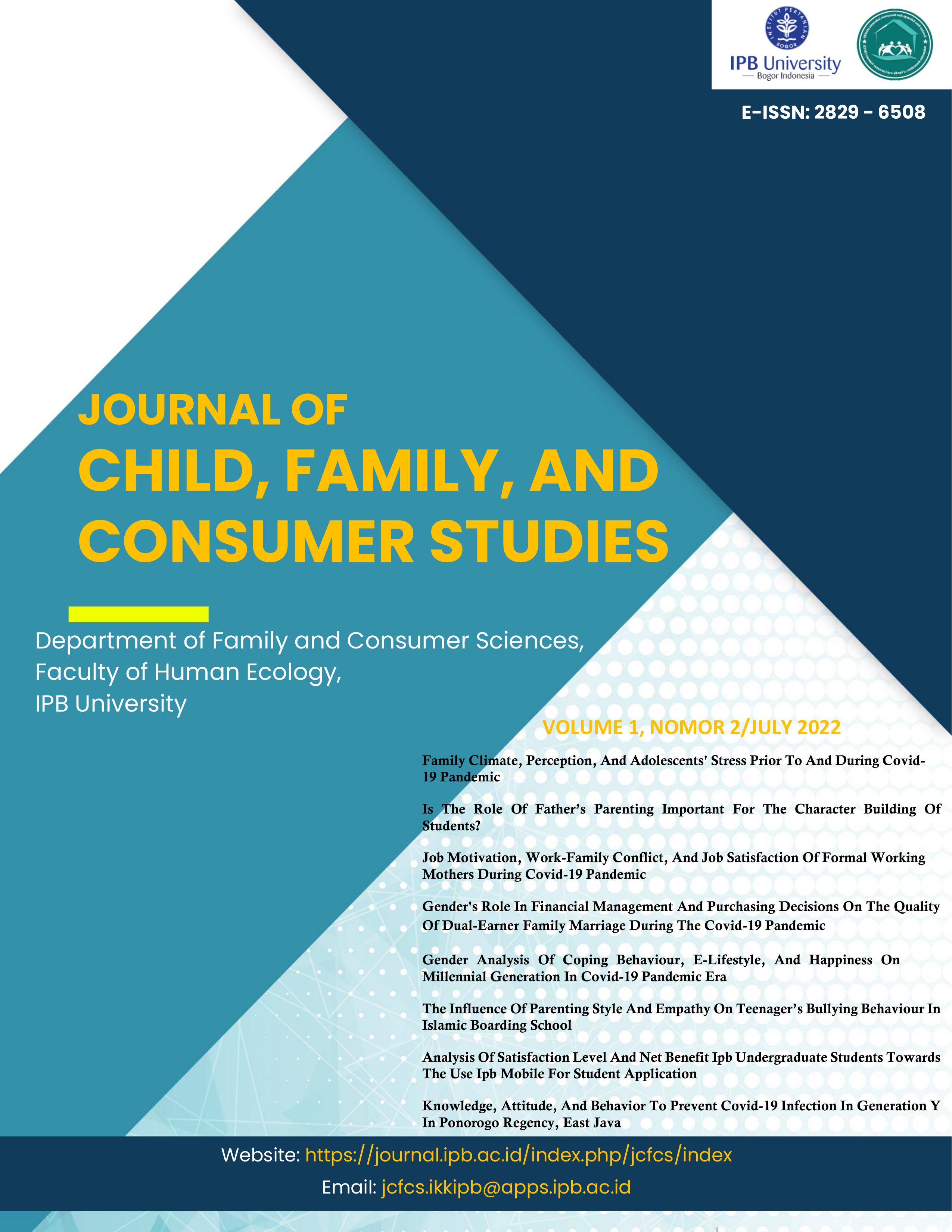GENDER'S ROLE IN FINANCIAL MANAGEMENT AND PURCHASING DECISIONS ON THE QUALITY OF DUAL-EARNER FAMILY MARRIAGE DURING THE COVID-19 PANDEMIC
Abstract
The misalignment of gender roles can affect the quality of marriage because it causes conditions of injustice, and one of the parties will be harmed. This study aims to determine the effect of gender roles in financial management and purchasing decisions on the quality of family marriages during the Covid-19 pandemic. A cross-sectional study design was used in the study. The method used is self-management with an online questionnaire. The study was conducted in DKI Jakarta, which was selected purposively. The voluntary sampling technique was used to obtain 106 working wives who have children and are domiciled in DKI Jakarta. The collected data were processed using Microsoft Office Excel software, Statistical Package for Social Science (SPSS) 25.0 for windows, and Smart Partial Least Square (SmartPLS). The results showed that the amount of education and income of husbands, children, family size, and gender roles in financial management and purchasing decisions were related to marriage quality. Furthermore, the regression test results show that the husband's income and gender roles in purchasing decisions positively affect the quality of marriage. This study suggests that families further improve the distribution of balanced roles in financial management activities and strategies to improve role performance.
References
Agustina, E., Ernawati, Irvita, M., & Putri, C. P. (2021). The impact of the Covid-19 pandemic in the perspective of gender equality. Proceedings of the National Conference of Nahdlatul Ulama University of Indonesia, 1(1), 89–100.
Allendorf, K., & Ghimire, D. J. (2012). Determinants of marital quality in an arranged marriage society. Social Science Research, 42(1), 59–70. https://doi.org/10.1016/j.ssresearch.2012.09.002
[BPS] Central Bureau of Statistics. (2017). Profile of Indonesian women 2018. Ministry of Women's Empowerment and Child Protection; Ministry of Women's Empowerment and Child Protection. https://www.kemenpppa.go.id/lib/uploads/list/d9495-buku-ppi-2018.pdf
Conger, R. D., Elder, G. H., Lorenz, F. O., Conger, K. J., Simons, R. L., Whitbeck, L. B., Huck, S., & Melby, J. N. (1990). linking economic hardship to marital quality and instability. Journal of Marriage and the Family, 52(3), 643. https://doi.org/10.2307/352931
Faridawati, R., & Silvy, M. (2017). The influence of behavioral intentions and spiritual intelligence on the management of family finances. Journal of Business & Banking, 7(1). https://doi.org/10.14414/jbb.v7i1.1465
Firdaus, F., & Sunarti, E. (2009). The relationship between economic pressures and coping mechanisms with the well-being of the family of the tea-picking woman. Journal of Family and Consumer Sciences, 2(1), 21–31. https://doi.org/10.24156/jikk.2009.2.1.21
Garman, E. T., & Forgue, R. E. (2000). Personal finance.
Houghton Mifflin Company. Hadiwardoyo, W. (2020). National economic losses due to the Covid-19 pandemic. Baskara: Journal of Business and Entrepreneurship, 2(2), 83–92. https://doi.org/10.24853/baskara.2.2.83-92
Hakim, A. F., Sunarti, E., & Herawati, T. (2014). Financial management and financial satisfaction of the wife in the family with the husband and wife working. Journal of Family and Consumers Sciences, 7(3), 174–182. https://doi.org/https://doi.org/10.24156/jikk.2014.7.3.174
Helmi, A., & Sande. (2017). Division of roles in family purchasing decision-making. In Seminar Nasional Multi Disiplin Ilmu Unisbank 2017, 3(3). https://www.unisbank.ac.id/ojs/index.php/sendi_u/article/view/5020
Herawati, T., Pranaji, D. K., Pujihasvuty, R., & Latifah, E. W. (2020). Factors affecting the implementation of family functions in Indonesia. Journal of Family and Consumers Sciences 13(3), 213–227. https://doi.org/10.24156/jikk.2020.13.3.213
Hurlock, E. (1980). Developmental psychology: An approach throughout the span of life. Erlangga.
James, C., Commerce, A., & College, C. (2012). Feminine role and family purchasing decisions. 1(3), 76–85.
Japarianto, E. (2017). Analysis of the influence of family types, family stages, and household conflicts on family car purchase decision-making. Journal of Community Management, 11(1), 32–39. https://doi.org/10.9744/pemasaran.11.1.32-40
Lambrecht, J., & Lievens, J. (2008). Pruning the family tree: An unexplored path to family business continuity and family harmony. Family Business Review, 21(4), 295-313. https://doi.org/10.1177/08944865080210040103
Lavee, Y., & Katz, R. (2002). Division of labor, perceived fairness, and marital quality: The effect of gender ideology. Journal of Marriage and Family, 64(1), 27–39. https://doi.org/10.1111/j.1741-3737.2002.00027.x
Lestari, S. (2012). Family psychology of the cultivation of values and the handling of conflicts in the family. Kencana Prenada Media Group.
Mader, K., & Schneebaum, A. (2013). The gendered nature of intra-household decision-making in and across Europe, 157). http://www.wu.ac.at/economics/forschung/wp
Manoharan, P. K., & Vijayalakhsmi. (2012). Role of family members in the purchase of television. International Journal of Multidisciplinary Research, 2(5), 99-123 http://zenithresearch.org.in/images/stories/pdf/2012/May/ZIJMR/11_ZIJMR_Vo l2_Issue5_May 2012.pdf
Mizfar, F., & Sinaga, A. (2015). Analysis of factors affecting the purchase of instant coffee. SEPA: Journal of Socioeconomics of Agriculture and Agribusiness, 11(2), 175–180. https://jurnal.uns.ac.id/sepa/article/view/14172/11790
Nengse, A., & Sadewo, F. X. S. (2013). Wife construction of the role of the husband (the study of the wife who has a greater income than the husband). Paradigma, 1(3), 1–7. http://jurnalmahasiswa.unesa.ac.id/index.php/paradigma/article/view/3368
Nofianti, L., & Denziana, A. (2010). Family financial management. Marwah: Jurnal Perempuan, Agama Dan Jender, 9(2), 192. https://doi.org/10.24014/marwah.v9i2.481
Nurhamida, Y. (2013). Power in marriage in working mothers and housewives. Journal OfPsychogenesis, 1(2), 185–198. https://doi.org/http://academicjournal.yarsi.ac.id/index.php/Jurnal-Online- Psikogenesis/article/view/45/pdf
Olson, D. H., Waldvogel, L., & Schlieff, M. (2000). Circumplex model of marital and family systems: An update. Journal of Family Theory and Review, 11(2), 199– 211. https://doi.org/10.1111/jftr.12331
Puspitawati, H. (2014). Resilience of gender justice. Available at https://herienpuspitawati.files.wordpress.com/2014/02/ketahanan- perkawinan.pdf
Puspitawati, H. (2017). Gender and family: Concepts and realities in Indonesia (revised). IPB Press.
Puspitawati, H., Azizah, Y., Mulyana, A., Rahmah, A. F., Relations, G., Resilience, F., & Laborers, O. F. (2019). Gender relations, family resilience and the quality of marriage in families of fishermen and farm workers "brondol" shallots. 12(1), 1–12. https://doi.org/http://dx.doi.org/10.24156/jikk.2019.12.1.1
Puspitawati, H., & Fahmi, S. A. (2008). Analysis of the division of gender roles in peasant families. Journal of Family and Consumer Sciences, 1(2), 131–140. https://doi.org/10.24156/jikk.2008.1.2.131
Putri, D. P. K., & Lestari, S. (2015). The division of roles in the household in Javanese married couples. Journal of Humanities Research, 16(1), 72–85. http://journals.ums.ac.id/index.php/humaniora/article/view/1523
Ramli, M., & Apriyanto, M. (2020). Financial management to improve the family economy during the Covid-19 pandemic. BAPPEDA Journal, X(X), 1– 8
Rizkillah, R., Sunarti, E., & Herawati, T. (2015). Marriage Quality and environment parenting on a family with a working husband and wife. Journal of Family and Consumer Sciences, 8(1), 10–19. https://doi.org/10.24156/jikk.2015.8.1.10
Rustiaria, A. P. (2017). The influence of financial knowledge, materialism, and locus of control on family financial management behavior. In STIE Perbanas Surabaya. College of Economic Sciences.
Seelig, A. N. Z. (2016). “To each their own”: Comparing satisfaction, money management, and financial communication across couple types (Issue Theses and Dissertations, 1238) [University of Wisconsin]. https://dc.uwm.edu/cgi/viewcontent.cgi?article=2243&context=etd
Setiawati, F. A., & Nurhayati, S. R. (2020). The quality of marriage of Javanese: A review of gender factors, age of marriage, number of children, and family expenses. Journal of Family and Consumer Sciences, 13(1), 13–24. http://jurnal.ipb.ac.id/index.php/jikk/article/view/27857/19216
Sumarwan, U. (2014). Consumer behavior (Second). Ghalia Indonesia.
Taniguchi, H., & Kaufman, G. (2020). Sharing the load: Housework, joint decision- making, and marital quality in Japan. Journal of Family Studies, 1–20. https://doi.org/10.1080/13229400.2020.1769707
Thorir, F. U. (2018). Correlation of economic income and maturity of spouses to household harmony of underage marriage perpetrators in Wedusan Village, Tiris, Probolinggo. Asy-Shari'a Journal of Islamic Law, 4(1), 77–110. https://doi.org/10.36835/assyariah.v4i1.103
Trisnaningsih, S., & Widyasari, F. (2010). Family finances to housewives in the siwalan kerto area of Surabaya. Journal of Accounting Strategy, 2(1990), 1–32.
Virmani, M. (2013). Modeling buying pattern in emerging Indian urban families. Journal of Sociological Research, 4(1), 378–389. https://doi.org/10.5296/jsr.v4i1.3617
Yamali, F. R., & Putri, R. N. (2020 The impact of COVID-19 on the Indonesian economy. Economics: Journal of Economics and Business, 4(2), 384. https://doi.org/10.33087/ekonomis.v4i2.179
Zhang, X. (2012). The effects of parental education and family income on mother-child relationships, father-child relationships, and family environments in the people’s republic of China. Family Process, 51(4), 483–497. https://doi.org/10.1111/j.1545-5300.2011.01380.x










